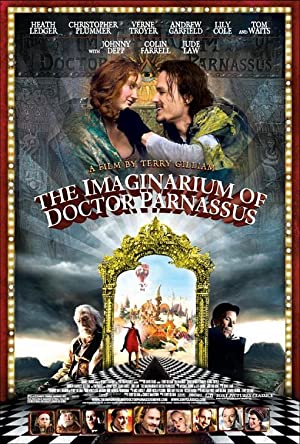The Imaginarium of Doctor Parnassus is about the intersection of fantasy and the real world in the person of the titular character who is the patriarch and literal mastermind of an old-fashioned travelling theater show that is not only severely impoverished and an anachronism on the streets of twenty-first century London, but in danger of getting the wrong kind of attention as attendees of the show fall prey to its dangerous, but initially seemingly innocuous temptations. Doctor Parnassus’ daughter, Valentina, is in peril as she reaches her sixteenth birthday, but the troupe crosses paths with a man who may drum up business enough to save her from the consequences of her father’s dalliances with the devil.
The Imaginarium of Doctor Parnassus is the last film that Heath Ledger worked on before he died, which is the main reason that it ended up in my queue. Terry Gilliam directed it, which is another attraction. It also stars Christopher Plummer as the titular character, Andrew Garfield, Jude Law and Colin Farrell, which are other reasons to recommend it. Johnny Depp is thankfully restrained in this film, but he still owes me money for wasting my time on so many dreadful movies and commercials of his dreadful movies that my mood ranged from indifferent to only mildly annoyed at his presence to grateful that he was not in the movie that long.
I did not like The Imaginarium of Doctor Parnassus. Gilliam was at his most visually and narratively self-indulgent, and on his best days, he is not known for his temperate style so it was all a bit much for my taste. The story made sense, but felt as if it was made less for the benefit of the viewer than the creator and was too sprawling and messy in its structure. Gilliam seemed to be meditating on being a creator, the artistic compromises made for immortality through a desire to appeal to a broader audience and the sacrifice of your beloved creation to an unworthy, dangerous fate in exchange for that selfish impulse. It feels as if there are two main characters which are autobiographical and embody the cynical marketer and creative lofty self of Gilliam’s identity.
On the other hand, I will not entirely hold it against him because The Imaginarium of Doctor Parnassus is clearly a labor of love, grief and collaboration in response to Ledger’s sudden death. I can give theoretical appreciation for how Gilliam and Ledger and Gilliam’s friends creatively responded to his passing: make Depp, Law and Farrell take over Ledger’s role, but still make sense within the overall plot. Depp is how women who don’t know Ledger’s character see him. Ledger’s character sees himself as Law. Valentina sees him as Farrell. Also the trio deserves real life praise for giving their salary to Ledger and Michelle Williams’ daughter because his will was old and made no provisions for her. Lawyer sidenote: we’re all going to die. Prepare for it!
Ultimately the deal breaker of The Imaginarium of Doctor Parnassus is the Smurfette character, which betrays a latent, subconscious misogynistic impulse that probably had a well-intentioned conscious original meaning. There is only one female character of note, Valentina, who is played by Lily Cole. I’m not familiar with Cole’s work although she has apparently been in a number of movies that I’ve seen, but I don’t specifically recall her. My criticism is of her character as it is written, not as it was acted. My quarrel isn’t with Cole, but Gilliam.
Valentina has no agency or desires other than her attraction to Ledger’s character, which sure, that is completely reasonable and understandable, she is only human, but difficult to stomach considering that she is also solely defined by her relationship to men. She is her father’s pawn, her coworker’s love interest and another’s plaything. The minute that she has sex and becomes a woman (dear men, some of us become women when we get our periods), she becomes the inherently suspect woman, a temptress, who would even put off the devil himself with her innately seductive and wanton ways. I found the whole tug of war over her destiny distasteful because while the movie acknowledges that her father’s deal is wrong, it is not wrong because she has no choice because even the movie thinks that she should not have choices, but because her deserving coworker, the nice guy, does not get what he wants. Her redeemed life is as a wife and mother. Um, one minute you’re single and sixteen then the next, you’re nurturing others with adult responsibilities. Can she be alone for more than a second? Nope, she needs a man to shepherd her. The whole trajectory of her life seems vaguely incestuous in a way that I can’t quite put my finger on. I suppose that she is lucky that she is not another woman who died in childbirth. Side note: even the devil isn’t a pedophile.
The other women characters are generally negative. Even the Devil is flawed, but likeable. The Imaginarium of Doctor Parnassus had other problematic moments of whimsy, particularly when it delves into the titular character’s origin story, which seems to be reminiscent of Eastern mysticism, but now with all Caucasian characters. There is a “is that blackface” moment that I will leave to individuals to judge.
The Imaginarium of Doctor Parnassus is a must see for Gilliam and Ledger completists such as myself, but I would not recommend it to anyone else unless they are fans of the rest of the casts, and even then, I would only recommend it with huge reservations because the story was one of Gilliam’s weakest to date. While its weaknesses are understandable since they are rooted in human emotion and mortality, it does not mean that you should have to suffer through it. Skip it.
Stay In The Know
Join my mailing list to get updates about recent reviews, upcoming speaking engagements, and film news.





